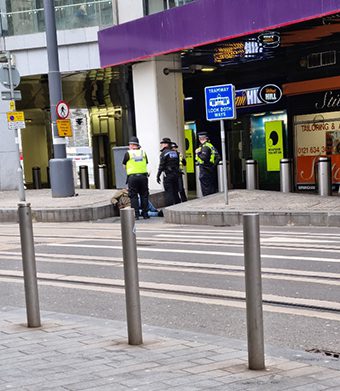The flags are out across New Street in Birmingham, as in other city and town centres, writes Mark Rowe.
They’re for the coronation of King Charles III, though they could have been for the Home Secretary Suella Braverman hailing that the Conservatives had delivered on their manifesto commitment of an ‘uplift’ of 20,000 ‘extra’ police officers. Labour’s home affairs spokesperson Yvette Cooper meanwhile complained that the Tories had merely brought numbers of police back to what they were when the Coalition took power from Labour, in 2010. She and Labour have made their own promise to bring more police onto the streets. Neither political party has detailed what those police are actually to do.
Around 9am on Thursday, April 27 beside the pedestrian ramp that leads from New Street to the rail station and Grand Central shopping centre, a man lay slumped and lifeless. A man with a blanket around his shoulders sat apathetically facing him. A pair of police officers were crouched on either side of the lifeless man; a policeman on the man’s left, while a policewoman on the man’s right was giving heart massage while wearing black hygienic gloves.
The watching man got to his feet and shuffled off slowly towards the Bull Ring. Passers-by ignored the scene or at most gave it a glance; they’ve seen it all before. Indeed, even Professional Security Magazine has, when it featured the city centre’s business crime reduction partnership in 2019; zonked-out men, presumably having taken the drug ‘spice’, lying on the pavement.
The lifeless man moved an arm. The two police officers held the man by a shoulder each; they didn’t move him very far. At a maximum, five police were at the scene; one got onto his radio. A few minutes later they were gone; the revived man was about two yards from where he’d been, trying with painful, koala-like slowness to raise himself to his feet. He failed, and sat instead where he’d been.
It’s futile therefore to complain about the begging that you cannot help but encounter around New Street station, on the concourse where the public can walk, and above the platforms that are access-controlled by ticket gates. If someone in uniform were to move the beggars on (assuming they’re the same as the ones seen zonked-out) they would only come back until they have wheedled or intimidated enough money out of travellers and shoppers, to buy some more spice.
Police have a point when they complain that as the emergency service they are picking up work that other agencies are not, ever since the 2010s austerity. If M&S in Birmingham city centre has detained someone for trying to thieve a bottle of wine, as Professional Security witnessed in 2019, and waits for police to attend for an hour and then lets the thief go because no police come, no-one is expecting a paramedic to do the bobby’s task instead and take the thief into custody on his motorcycle.
Let’s leave aside the stupid and cynical remark by junior Home Office minister Chris Philp that crime has halved since 2010 ‘excluding fraud and computer misuse’, in other words, the number one crime by volume (as, a few days on, the Home Office’s fraud strategy acknowledges); as if anyone would dare say that deaths from traffic accidents have fallen in every county, except the county with the most deaths.
All talk about police is in terms of crime. Yet that’s not the reality of policing; they are doing social and health services’ work; or rather, not doing it, but (at most) getting the addicts back on their feet, to do it again an hour later and on the next shift. Not that more spending on those caring services, so called, would help the users of spice. Their ‘chaotic lifestyles’, to use the jargon, means they are not even thinking of food, but the next spice they want to take.
Like other problems, they remain unsolved; not new. They’re the reality for private security also, whether working at railway stations, or shopping malls or convenience stores: keep the vagrants out. What passes for public policy such as the proposed change to the Vagrancy Act will make no difference, because police will do everything to avoid arresting spice-takers, which will only mean paperwork, cost, hassle, and will only end in the addict on the street again. It’s one reason (as a local government CCTV man told Professional Security the other day) why police choose to avoid responding to shop crime when reported to them. Police will radio back that resources are not available to attend a shop thief (likely a addict with a bad smell who will be uncooperative and may turn violent). An incident at a local college that gives police the opportunity to have a sexy high-speed drive? Resources are suddenly available. On Planet Braverman, such reality doesn’t exist. Put out more flags!










